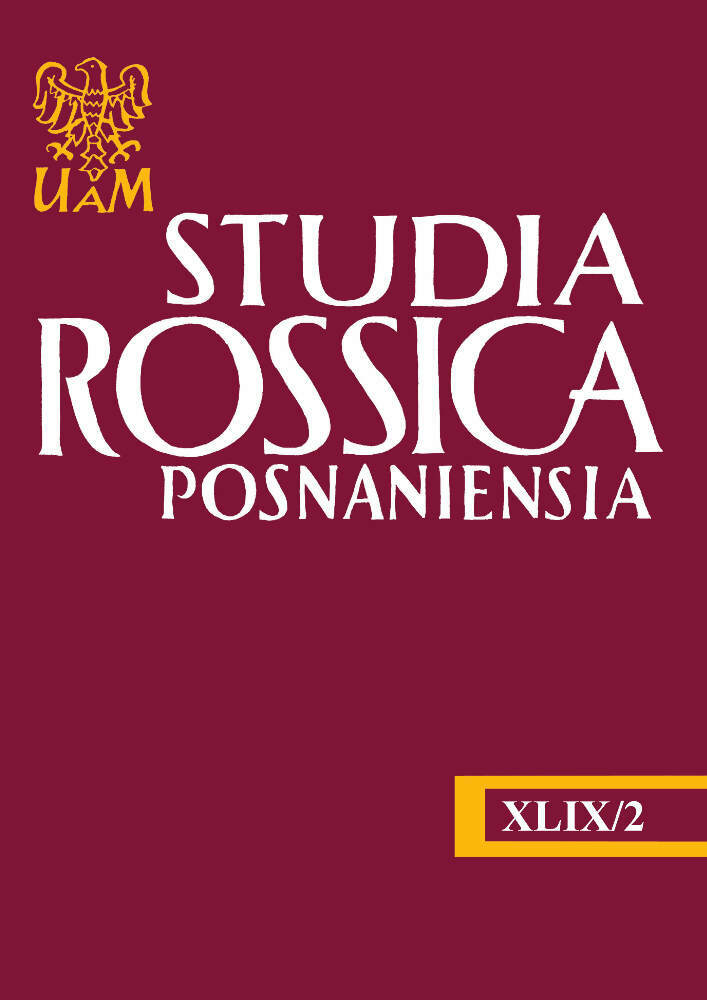Abstract
The armed conflict in Ukraine, continuing in its culminating form since 24.02.2022, exists in two dimensions – on the battlefield and in the information space. In this second dimension, the main role is played by language, used as a potent weapon, one of the prominent functions of which is that of dehumanization. By violating the norms of constructive public communication, the creators of this discourse – journalists, opinion leaders, activists, politicians – activate the destructive potential of language. The dehumanizing discourse of the armed conflict in Ukraine, however, has not yet received a vigorous linguistic elaboration. The aim of this article is to raise this complex and important issue. By giving various examples of acts of linguistic dehumanization observed in the widely understood linguistic space of the armed conflict in Ukraine, the author identifies the main directions of dehumanization discourse within the Russian-Ukrainian linguo-cultural space. The author’s provided examples of dehumanizing statements facilitate the identification of both explicit and subtle dehumanization techniques prevalent within this discourse. At the same time, public figures are actively involved in the retransmission of dehumanizing content, which significantly affects the dynamics of this discourse and increases the range of its potential active and passive participants.
Literaturhinweise
Agadullina, Elena. „Degumanizaciâ: podhody k ocenke neprâmyh predubeždenij”. Socialʹnaâ psihologiâ i obŝestvo, 12 (2), 2021, s. 5–22. DOI: https://doi.org/10.17759/sps.2021120201
Bandura, Albert. „Selective moral disengagement in the exercise of moral agency”. Journal of Moral Education, 31 (2), 2002, s. 101–119. Web. 02.09.2023. DOI: https://doi.org/10.1080/0305724022014322
Bauman, Zygmunt. Nowoczesność i zagłada. Przeł. Franciszek Jaszuński. Warszawa, Fundacja Kulturalna Masada, 1992.
Brennen, Scott, Daniel Kreiss. „Digitalization and digitization”. Culture Digitally. Web. 11.05.2024. https://culturedigitally.org/2014/09/digitalization-and-digitization/.
Citlak, Amadeusz. „Dehumanizacja – zaburzenie i patologia czy permanentny stan ludzkiego umysłu? Spojrzenie z perspektywy psychologii poznania społecznego”. Acta Universitatis Wratislaviensis. Studia nad autorytaryzmem i totalitaryzmem, 37 (1), 2015, s. 13–34.
Citlak, Amadeusz. „Psychologiczne i językowe uprzedmiotowienie obcych (stereotypizacja i dehumanizacja wrogów)”. Acta Universitatis Wratislaviensis. Studia nad autorytaryzmem i totalitaryzmem, 40 (4), 2018, s. 7–30. DOI: https://doi.org/10.19195/2300-7249.40.4.1
Gusejnov, Gasan. „Ob odnom nevolʹnom èksperimente v russkoj političeskoj ritorike XXI veka”. Neprikosnovennyj zapas, 4, 2020, s. 109–129. Web. 02.09.2023. https://www.academia.edu/44820867/Об_одном_невольном_эксперименте_в_русской_политической_ритори-ке_XXI_века.
Ismanov, Almaz et al. Ot âzyka vraždy k nenasilʹstvennoj kommunikacii. Biškek, Prevention media, Associaciâ kommunikatorov pri podderžke PROON, 2023.
Leyens, Jacques-Philippe et al. „Psychological essentialism and the differential attribution of uniquely human emotions to ingroups and outgroups”. European Journal of Social Psychology, 31, 2001, s. 395–411. DOI: https://doi.org/10.1002/ejsp.50
Radčenko, Darʹâ. „«Žarenyj ukrop» s «krovʹû mladencev»: piŝevye kody rossijsko-ukrainskogo konflikta”. Antropologičeskij forum, 31, 2016, s. 209–234.
Ścigaj, Paweł. „Dehumanizacja i depolityzacja”. Politeja, 2 (77), 2022, s. 87–118. DOI: https://doi.org/10.12797/Politeja.19.2022.77.04
Volpato, Chiara. Negare l’altro. „La deumanizzazione e le sue forme”. Psicoterapia e scienze umane, XLVII, 2013, s. 311–328. Web. 02.09.2023. http://www.researchgate.net/publication/269677889. DOI: https://doi.org/10.3280/PU2013-002012
Wagner, Wolfgang, Peter Holtz, Yoshihisa Kashima. „Construction and deconstruction of essence in representing social groups: Identity projects, stereotyping, and racism”. Journal for the Theory of Social Behavior, 39 (3), 2009, s. 363–383. DOI: https://doi.org/10.1111/j.1468-5914.2009.00408.x
Waytz, Adam. The power of human. How our shared humanity can help us create a better world. New York, London, W.W. Norton & Company, 2019.
Lizenz
Copyright (c) 2024 Paulina Bortnowska

Dieses Werk steht unter der Lizenz Creative Commons Namensnennung - Nicht-kommerziell - Weitergabe unter gleichen Bedingungen 4.0 International.

